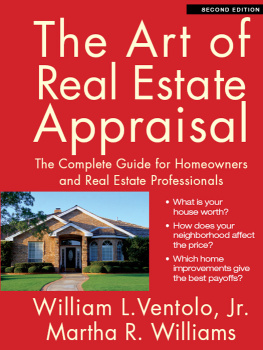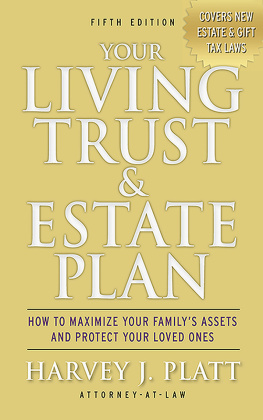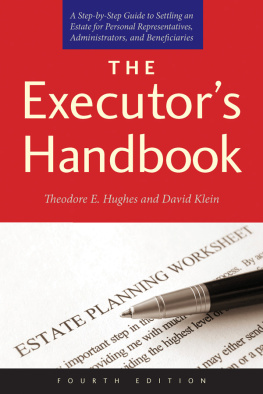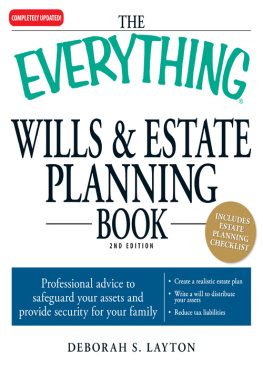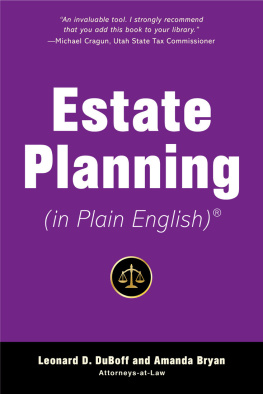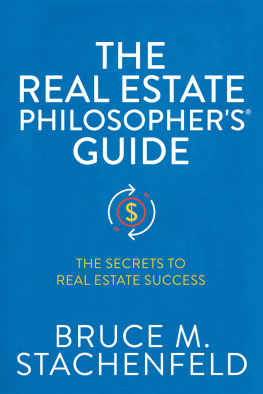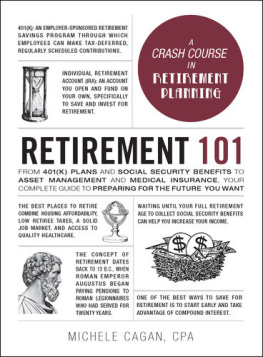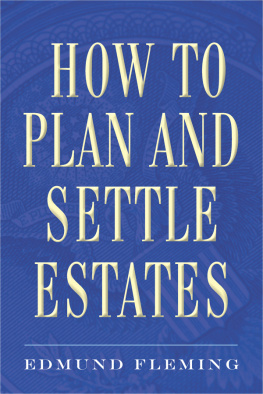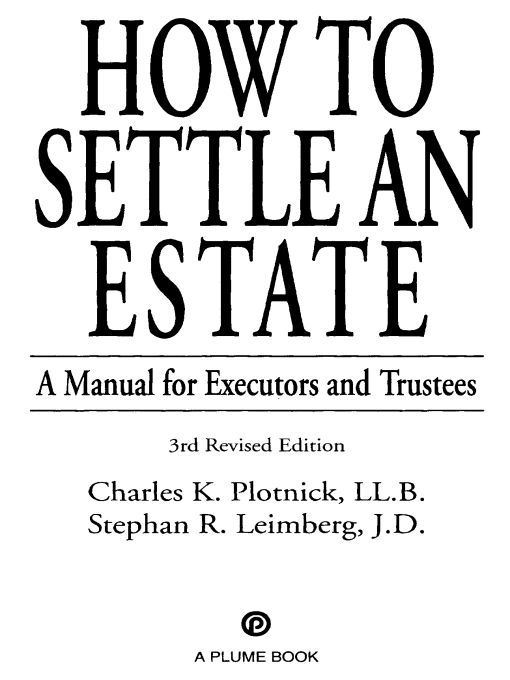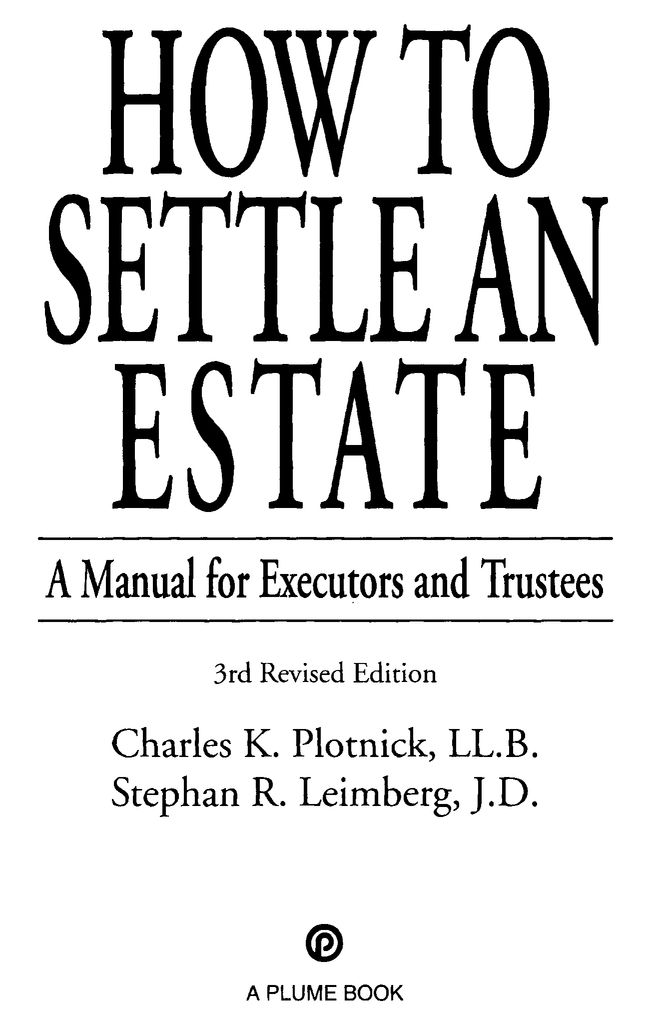Table of Contents
FINALLY ... ALL YOU NEED TO KNOW ABOUT SETTLING AN ESTATE
Discover the facts about:
*Pre-death Planning Techniques
*Probating the Estate
*Avoiding Fiduciary Liability
*Tangible Personal Property
*Government and Fringe Benefits
*Life Insurance
*Cash, Bank Accounts, and Listed Securities
*Real Estate
*Handling a Family Business
*Jointly Owned Property
*Trusts and Guardianships
*Debts and Expenses
*Inventorying the Assets
*State Death Taxes
*Gift-tax Returns
*Tax Elections
... and much, much more.
Complete with timetables and checklists, How to Settle an Estate is the only guide you will ever need!
CHARLES K. PLOTNICK, L.L.B., is an attorney in Montgomery County, Pennsylvania, and specializes in estate planning. He is professor of estate planning at Temple University in Philadelphia.
STEPHAN R. LEIMBERG, J.D., is C.E.O. of Leimberg Information Services, Inc., a provider of tax law commentary, in Bryn Mawr, Pennsylvania.
To my father, Benjamin Plotnick, who so thoroughly enjoyed being with us all for eighty years.
Charles K. Plotnick
To my father, Edward Leimberg, who faithfully watered the money tree and fed the three-legged brown cow that gave chocolate milk.
Stephan R. Leimberg
Preface
We have updated this book because many changes have recently taken place. The tax revisions contained in the Economic Growth and Tax Relief Reconciliation Act of 2001 (EGTRRA) are significant. Everyone involved in the estate settlement process must be familiar with these changes. Aside from changes in the estate and gift tax rates and exemptions, rules in regard to the distribution of retirement benefits have been dramatically liberalized. The use of disclaimers has also greatly enlarged the ability of the executor, administrator, or trustee to do post-death estate planning. It is therefore imperative that the person handling the estate be familiar with these changes and be in a position to impart whatever relevant information is needed to the beneficiaries of the estate.
There are three reasons How to Settle an Estate is different from any other book on the subject:
First, this is a no-holds-barred, honest look at the process, which you may not have obtained before. Rather than the panic and panacea approach (terrible things will happen if you dont buy this book, and rip out and fill out the forms; but all your problems will disappear in an instant with no thinking or outside help required if you do purchase this book), youll find a step-by-step, practical, objective consumers view of the subject. Inside these covers, youll find out the truth about probate, taxes, and the psychological aspects of being an executor or administrator, as well as what you need to do to protect yourself as an heir or beneficiary. You may even discover that the risks and responsibilities of being an executor outweigh the honor, and you may decide to decline. You may also decide that the person youve considered naming as your executor may not be capable of handling the tasks.
Second, rather than a quick once-over treatment, this book will provide you with the detailed, in-depth information to make considered, well-informed, intelligent decisions and ask the types of questions that will help you communicate more effectively (which often translates into fewer billable hours) with your attorney and other financial advisers. Unlike fine print books that are difficult to read and are written to impress rather than inform, or picture books that gloss over important details, this resource is both clear and comprehensive.
Third, rather than a do-it-yourself book, this is a think-for-yourself book. Rather than the simplistic ten-minute mentality (read this book and in ten minutes youll know everything you need to know about settling an estate), this book will give you the questions you need to ask to be an informed and proactive executor, administrator, beneficiary, or heir.
How to Settle an Estate will help you save income, estate, gift, generation-skipping, and other taxes at both the federal and state level. It is also a book that will give you many nontax techniques to protect yourself and those you love from both creditors and predators, and provide security and management protection for generations.
We suggest you read How to Settle an Estate slowly. Read the first five chapters in order. Then go through the table of contents and select the category that you are most interested in learning about or the type of problem youd like to solve. Use it constantly throughout the estate settlement process. Were sure youll find this an invaluable and frequently used reference tool.
We would like to acknowledge the contribution of Jonathan H. Ellis, Esq., to the material on retirement plans, and to Susan L. Fox, Esq., for the material on Medicaid reimbursement.
Charles K. Plotnick, Esq.
Stephan R. Leimberg, Esq.
Introduction
STOP! Before you take any action whatsoever as the executor of your late fathers estate, we strongly recommend that you review the first nine chapters of this book. There may be several extremely valuable options available to you as executor to maximize benefits for the estates beneficiaries, and these options may be lost by your failure to take appropriate action or by taking the wrong action prematurely!
Death tax laws, which have always been complex, have now been made even more so by recent tax changes. Now, more than ever, the date a person dies, as well as the size of their estate, will determine whether or not federal estate taxes are due. Today, more than ever before, the use of disclaimers as indicated in Chapter 9 can not only result in reducing death taxes but can shift assets from one generation to the next in a surprisingly efficient manner.
As the executor of your fathers estate, your position is similar to that of stepping in cold to become the chief executive of your fathers business. You are unfamiliar with the day-to-day affairs of the business, lack managerial experience, and even more serious, you have very little knowledge of the duties, responsibilities, and liabilities that come with operating a large business.
As executor, you are probably not aware of what your responsibilities will be to the other members of your family, to your fathers creditors or other business associates, and to the state and federal governments to which your fathers estate may be responsible for death taxes.
The likelihood of being called on to act as executor, or personal representative, for a relative or deceased friend is quite high. When that time comes, we all hope that competent advisers will be available to help us. Nevertheless, the ultimate decisions and the responsibilities fall on the executors themselves.
This book provides specific information to help guide you throughout your tenure in office. It is not written for the attorney, trust officer, accountant, or other adviser or professional executor (although in many instances it will be of considerable value to them), but rather to inform you, the lay executor, exactly what you are or will be required to do in order to handle the affairs of a deceased person properly. Because of the widespread interest today in revocable living trusts, we have included a special chapter that explains the duties of a trustee in this situation.


